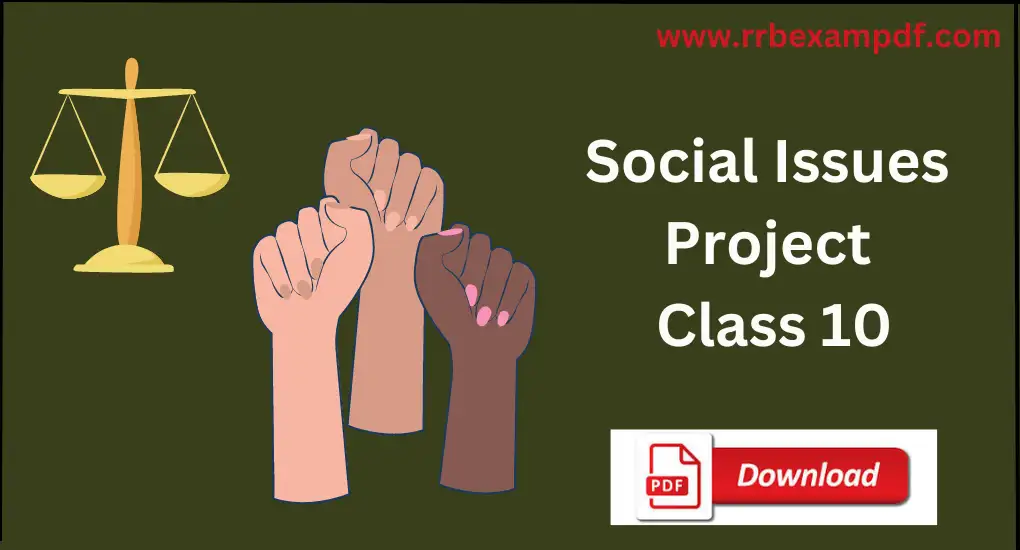Social Issues Project Class 10: Social issues are prevalent in every society, Social issue Project for CBSE Class 10th. and India is no exception. As a diverse and dynamic nation, India grapples with a range of social challenges that impact the lives of its citizens. From gender inequality and poverty to caste-based discrimination and lack of access to quality education, these issues pose significant obstacles to progress and development. यदि आप क्लास 10वीं में पढ़ते हैं और आपको सामाजिक इश्यू पर कोई प्रोजेक्ट बनाना है तो हम आपकी इसमें पूरी हेल्प करेंगे कि कैसे आप सामाजिक इश्यू पर क्लास 10वीं के लिए आप प्रोजेक्ट बना सकते हैं यह प्रोजेक्ट सीबीएसई क्लास 10 सोशलिज्म प्रोजेक्ट पर भी सम्मिलित है.

Major Social Issues in India
- Gender Inequality
- Poverty and Income Disparity
- Caste-Based Discrimination
- Lack of Quality Education
- Environmental Degradation
- Child Labour
- Healthcare Disparities
- Discrimination Based on Religion
- Mental Health Stigma
- Corruption
Social Issue Projects for Class 10 on the following Topics
- लिंग असमानता (Gender Inequality):
लिंग असमानता एक सामाजिक समस्या है जिसमें महिलाओं और पुरुषों के बीच असमानता होती है। इस परियोजना में, आप लिंग असमानता के कारणों, प्रभावों और इसके समाधान पर ध्यान केंद्रित कर सकते हैं। - गरीबी और आय असमानता (Poverty and Income Disparity):
गरीबी और आय के असमानता से जुड़े इस परियोजना में, आप गरीबी के कारणों, सामाजिक प्रभावों, और समाधानों को जानकारी प्रदान कर सकते हैं। - जातिवाद (Caste-Based Discrimination):
जातिवाद से जुड़े इस प्रोजेक्ट में, आप जातिवाद के विभिन्न पहलुओं को अन्वेषण कर सकते हैं और इसे समाप्त करने के लिए सुझाव प्रदान कर सकते हैं। - गुणवत्ता शिक्षा की कमी (Lack of Quality Education):
इस विषय में, आप शिक्षा की कमी के कारणों, उसके प्रभावों, और उसे सुधारने के लिए कार्रवाईयों पर विचार कर सकते हैं। - पर्यावरणीय अपशिक्षा (Environmental Degradation):
पर्यावरणीय अपशिक्षा के समृद्धि और पर्यावरण की सुरक्षा के लिए उपायों पर ध्यान केंद्रित करें। - बाल श्रम (Child Labour):
बाल श्रम के कारणों, प्रभावों, और इसे समाप्त करने के लिए उपायों पर विचार करें। - स्वास्थ्य सेवा असमानता (Healthcare Disparities):
स्वास्थ्य सेवा के असमानता से जुड़े इस परियोजना में, आप स्वास्थ्य सेवाओं के पहुंच में होने वाली असमानता की विशेषताओं पर चर्चा कर सकते हैं। - धर्म के आधार पर भेदभाव (Discrimination Based on Religion):
इस विषय में, आप धर्म के आधार पर होने वाले भेदभाव की बात कर सकते हैं और इसे कम करने के लिए सुझाव प्रदान कर सकते हैं। - मानसिक स्वास्थ्य की कलंक (Mental Health Stigma):
मानसिक स्वास्थ्य के संबंध में, आप मानसिक स्वास्थ्य कलंक के कारणों, प्रभावों और जागरूकता बढ़ाने के लिए उपायों पर विचार कर सकते हैं। - भ्रष्टाचार (Corruption):
भ्रष्टाचार के विभिन्न पहलुओं पर विचार करें और इसको कम करने के लिए सामाजिक परिवर्तन के लिए सुझाव प्रदान करें।
Download PDF on Social Issues Project Class 10
To download the PDF on Social Issues Project Class 10, the link is given below you can download and make your Project.
